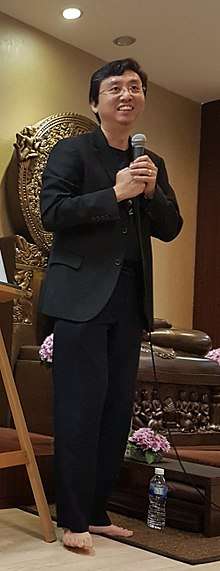Chade-Meng Tan

Chade-Meng Tan (Chinese: 陳一鳴), known informally as Meng, is a former software engineer and motivator formerly at Google known especially for greeting celebrities who visit the Google campus. Meng is also an international bestselling author, thought leader and philanthropist. He retired from Google as its Jolly Good Fellow at the age of 45. He is Chairman of the Search Inside Yourself Leadership Institute and Co-chair of One Billion Acts of Peace, which has been nominated eight times for the Nobel Peace Prize. He is also Adjunct Professor at the Lee Kuan Yew School of Public Policy in the National University of Singapore and a graduate from Nanyang Technological University, Singapore.
He was Google employee number 107 and his job title was Jolly Good Fellow.[1] He joined Google in 2000 after working for five years at Kent Ridge Digital Laboratories in Singapore. At Google, although he worked for eight years in Engineering on projects such as mobile search and leading search quality, he earned his eccentric Google title after starting “mindfulness training” courses at the company - a groundbreaking mindfulness-based emotional intelligence course called Search Inside Yourself, which was featured on the front page of the Sunday Business section of the New York Times.[2] Search Inside Yourself is also the title of Meng's New York Times bestselling book which has been endorsed by world leaders such as President Carter of the United States, business leaders such as Eric Schmidt of Google and John Mackey of Whole Foods Markets, and spiritual leaders such as the Dalai Lama. Meng hopes Search Inside Yourself will eventually contribute to world peace in a meaningful way.
Motivated by his belief that happiness is a state of mind, these mindfulness training courses were meant to help Googlers find inner peace and clear their minds to manage stress and negativity. The classes proved extremely successful at Google, which led Meng to write a best-selling book called “Search Inside Yourself.” These successes (outside of his engineering role) led him to work for two years as the Head of Personal Growth and to pursue full-time a non-profit called “Search Inside Yourself Leadership Institute” (SIYLI, pronounced “silly”), to bring the same popular Google class to others.[3][4]
Meng has left Google on October 30, 2015 to focus spreading his message and courses on happiness, meditation and spreading world peace, as announced on his personal blog.[5]
Meng is a publicly recognized figure. He started collecting celebrity photographs when Jimmy Carter and Al Gore visited the Google campus. This became a tradition and he now has a large collection of photographs of his meetings with celebrities at Google.[6]
Meng is still the Chairman of the Board of the Search Inside Yourself Leadership Institute, and is part of the team of the non-profit organisation, One Billion Acts of Peace that has been nominated for the Nobel Peace Prize in 2015. The nomination was signed by 6 Nobel Laureates.[7]
References
- ↑ Lucy Kellaway (June 7, 2012), "The wise fool of Google", Financial Times
- ↑ Kelly, Caitlin (2012-04-28). "Google Course Asks Employees to Take a Deep Breath". The New York Times. ISSN 0362-4331. Retrieved 2017-12-19.
- ↑ "Google's 'Jolly Good Fellow' retires so he can spend 3 hours a day meditating and help spread world peace - Business Insider". 2015-10-24. Retrieved 2016-07-11.
- ↑ "This Google engineer's title is 'Jolly Good Fellow' and he's solving unhappiness and war - Business Insider". 2015-09-19. Retrieved 2016-07-11.
- ↑ Chade-Meng Tan (October 30, 2015), Officially Retired From Google
- ↑ Steve Lohr (September 1, 2007), "Hey, Who's He? With Gwyneth? The Google Guy", New York Times
- ↑ Shefali Rekhi (January 9, 2015), "Singapore's Jolly Good Fellow in Google part of team nominated for Nobel Peace Prize", The Straits Times